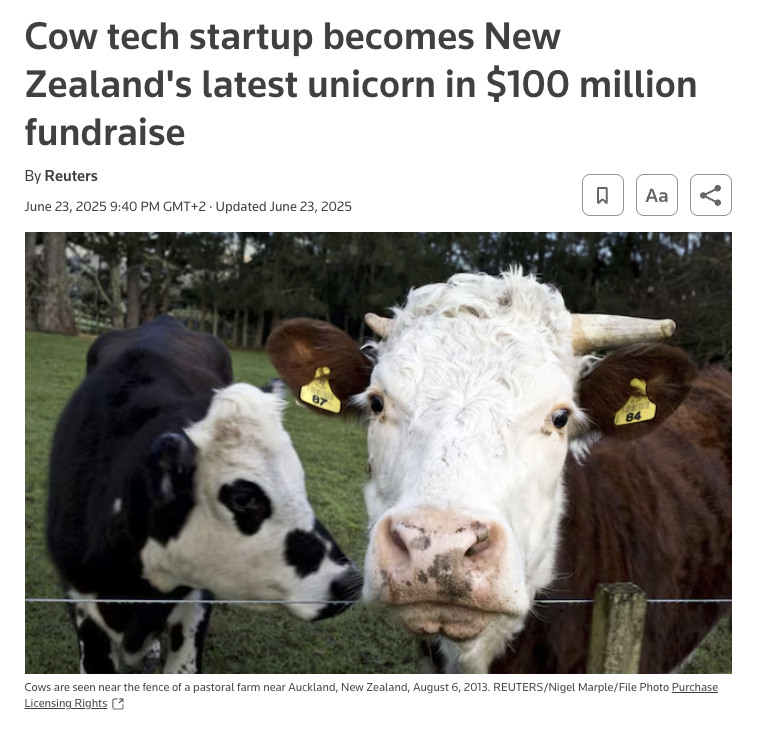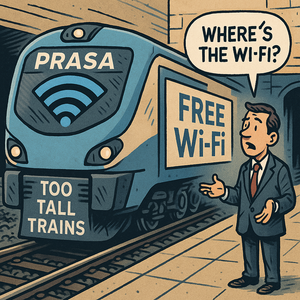I know this will come as a total shocker, and perhaps as somewhat naive, but I think both the government and business should tell fewer lies. This may startle you, I know. But honestly, I’m just sick of it - aren't we all?
Here is a concrete example. An old university friend, Katharine McKenzie, contacted me this week with an interesting story. We met when she was the editor of Wits Student and I was a contributor to the student mag back in the late 1980s.
She has spent much of her career in Cape Town's local government and as a public transport policy wonk. As a consequence, she says, she travels on public transport as much as possible, not only to get around but to get a feel for how these public services are actually working (or not). She has the admirable quality, IMHO, of getting pissed off very quickly, and being very straight and upfront about it. I know this because, during one of our first meetings, she told me my design for a page on Wits Student was “crap”. Some wounds stick with you.
Anyway, she told me she had recently won a case at the Advertising Regulatory Board against the Passenger Rail Agency of SA (Prasa). Prasa, which has a budget of R24-billion a year, is in the process of trying to rehabilitate itself. Prasa’s somewhat unusual state capture episode was both despicably criminal and surprisingly comical.
The central issue was, of course, the Swifambo Rail Leasing contract in 2012 when Prada ordered locomotives worth R3.5-billion from a Spanish manufacturer (Vossloh España) via a local intermediary, Swifambo. The trains turned out to be too tall for the country’s rail infrastructure, and investigations later found Swifambo was a front with no rail experience, selected through a corrupt tender process. The contract was invalidated by the courts.
Then came Covid-19 and the effective closure of the local train system for a couple of years. For reasons both laudatory and dubious, government is now desperate to reinvigorate its passenger rail system. Instead of using the opportunity to clean out the organisation and develop a public-private partnership or another new arrangement that may actually work, what government has done (and I am not making this up) is throw huge amounts of new cash at Prasa.
In his May 2025 budget speech, Finance Minister Enoch Godongwana announced that Prasa would receive R66.3-billion over the next three years. This includes R18.2-billion specifically for rolling stock renewal and R12.3-billion for upgrades to its signalling system. Prasa’s total budget was R15-billion in 2015, increasing by about R1-billion a year, despite a huge drop-off in passenger usage and its inability to deliver anything but awful service.
Anyway, in its effort to change public perception, to its credit, Prasa has been restoring public rail transport, particularly in Cape Town, and innovating. It's now offering, according to its advertisements, free wi-fi at stations! Just … revolutionary!
But, if you read the judgment, it seems there was quite a lot of lying. Some stations, at some times, if you were lucky, might provide free wi-fi. But generally, they didn't.
With admirable dryness, the ARB judgment panel said, “If free Wi-Fi is advertised, even if the service is limited to certain stations, then it is reasonable for a consumer to expect that the service actually works. An acknowledgement by the Advertiser that WIFI is not available at all stations, that the service is functional to some extent, is not sufficient for purposes of meeting the expectation created by the advertisement”.

Of course, government and its institutions are not the only ones lying these days. The private sector is a serial offender. The ARB has a host of judgements about private sector organisations, including a funny case of a KFC customer complaining there were too many chicken wings and too few drumsticks in his bucket, unlike the picture on the display panel. I’m totally with the applicant; KFC is snoep with its drumsticks. But sadly, the applicant lost the case because KFC does warn you that the illustrations are, well, illustrative.
But for me, there is an extra dollop of irritation about government and government institutions lying since they are doing it with our money. If KFC tell too many lies about their drumsticks, well, you can nip over to Chicken Licken. But with government institutions, there is often no choice or the choices are unrealistic.
The point is that the underlying incentive structure is different. A private sector organisation that lies to you is in danger of suffering competitive brand risk. When governments or politicians lie to you, you are only called on to judge that brand once every four or five years, and competitors are limited. The choice you make is aggregated over a range of issues. Some of those issues have to do with policy, some with identity. My priors might be showing here, but my guess is that government seems to get away with lying easier than the private sector, which is partly why they do it more frequently and with fewer consequences.
In truth, lying is a slippery little devil. We lie much more often than we think, I suspect. How many times have you described your friend’s haircut as “bold” when what you actually think is that it's a lawnmower’s wet dream. Lying is often a paradox, dusted with a sprinkle of moral ambiguity. The sunny side of lying is that it is the Q-20s of the social gears, lubricating awkward situations.
But generally, as we all know, lies erode trust, the glue of human connection. Betray a friend, and you’re not just breaking a bond—you’re torching the bridge and salting the earth.
And it doesn’t only hurt those who are lied to, but the liar as well. Psychologists say habitual lying rewires your brain, making it harder to distinguish fact from fiction. It’s like living in a funhouse mirror maze—eventually, you forget what’s real.

Doesn’t that strike you as true, particularly when it comes to politicians of our era; sometimes you think they lie so often that they don’t even notice it any more. As the saying goes, some people lie to protect you. Most just lie to protect themselves. 💥
From the department of loving a bit of cow tech ...

From the department of movie themes in 5/4 time ...

From the department of those who really like their pasta al dente ...

Thanks for reading - please do share if you have a friend (or enemy!) you think would value this blog and ask them to add their email in the block below - it's free for the time being. If the sign-up link doesn't appear, you'll find it on the site.
Also a correction: in the previous housekeeping note I said my email was stimcohen@google.com. Idiot! It is of course stimcohen@gmail.com. Appologies.
Till next time. 💥







Join the conversation